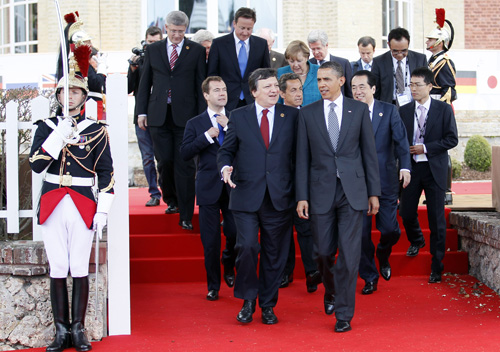The Transatlantic Alliance Survives the Summer

Writing in Foreign Affairs last week, I argued that the Libya mission was a significant success for the Obama Administration, not only for having ousted Qaddafi and prevented him from slaughtering Libyan citizens “like rats,” but also because the Obama Administration set the strategy and then stepped back to let Europe shoulder most of the burden. Messy or not, it was a model for how the United States can leverage its alliances to maintain its global leadership.
As recently as June, outgoing Secretary of Defense Robert Gates sharply rebuked America’s European allies for slashing defense budgets and avoiding military risks, predicting a “dim if not dismal future” for NATO. Yet, even during their most acute budget and debt crises in decades, the United States and Europe were able to stage an intervention together while rising powers like Brazil, Russia, India, and China, remained inert—or criticized from backstage. It may have been an “imperfect triumph,” Robert Kagan observes, but it also “disproved the increasingly common notion that the world’s great democracies are in terminal decline.” In fact, they remain more than prepared to defend their interests and values.
Back in May, CFR’s International Institutions and Global Governance program held a workshop in Berlin with the German Institute for International and Security Affairs (SWP) on “The Atlantic World and Rising Global Powers.” The purpose was to discuss the future of the transatlantic alliance—and the broader Western liberal order—in light of dramatic shifts in power that are fundamentally altering global politics.
The overarching conclusion from the two-day conversation was that the transatlantic alliance remains reasonably sound. To be sure, NATO’s vitality has been tested in Afghanistan by European retrenchment, resistance to burden-sharing, and divergent allied threat perceptions. The messy experience has led many U.S. defense officials to question its continued relevance in conducting out-of-area operations. But if NATO’s expeditionary capabilities are constrained, it retains an essential role as a collective defense organization uniting the world’s major advanced democracies, still capable of launching significant military operations—as evidenced by Libya.
Beyond the alliance itself, the U.S.-European partnership remains the bedrock of the Western liberal order created after 1945. The big challenge for both transatlantic pillars is how to respond to the dramatic rise of new powers in the developing world, who are clamoring for entrée into and greater weight within existing institutions, as well as changes to some of the fundamental norms of world order. For Europe and the United States, the dilemma is how far and how fast they should accommodate these demands, and how best to integrate rising powers as “responsible stakeholders” that accept the obligations (not just enjoy the privileges) of power.
Nuclear nonproliferation remains a prime area of cooperation for the United States and Europe, but both recognize that the regime is under increasing strain and lacks strong champions in the developing world. Among rising powers, both Brazil and India have long regarded the Nuclear Nonproliferation Treaty (NPT) as inherently discriminatory. Like many other developing countries, they chastise official nuclear weapons states (NWS) for their failure to implement the disarmament provisions contained in Article 6 of the NPT. Meanwhile, NWS Russia and China are anxious to profit commercially as exporters of nuclear energy technology, and have shown inconsistent concern for export control obligations. Established and emerging powers also tend to take very different attitudes to the question of how to handle noncompliance with NPT obligations. The United States and Europe, for example, have taken a much harder line on Iran than have Russia and China (or for that matter Brazil, which along with Turkey sought in spring 2010 to head off UNSC resolution 1929, which imposed the harshest sanctions to date on the Iranian regime.) All of this points to the need for continued transatlantic solidarity on nuclear matters.
On the other hand, when it comes to international economic governance, the tables may be turning faster. The U.S. and European nations both face enormous economic challenges, and are acutely aware that rising powers like China and Brazil seem to have weathered the recent economic recession better and are the new drivers of growth in the global economy. Whereas the emerging world has traditionally suffered crippling debt crises, these roles have been reversed: the eurozone bloc today faces a massive sovereign debt crisis that could threaten the integrity of EU, while the United States is mired in paralyzing, partisan debate over how to address its skyrocketing deficits, high unemployment, and anemic economic growth. These internal preoccupations leave both transatlantic pillars of the Western liberal order ill-equipped to lead the global economy, particularly with the discrediting of the previous Washington consensus.
Reform of global economic governance institutions has lagged too far behind enormous shifts in global economic weight. For instance, although the BRICs’ collective share of global GDP has risen from 10% to 18% over the past five years, the allocation of “shares and chairs” within the International Monetary Fund (IMF) has failed to keep pace. The transatlantic partners have been divided on this agenda. The United States has spearheaded efforts to restructure quota shares and executive board seats—only to face resistance from Europe, currently overrepresented on the IMF board and voting formula.
European and U.S. officials generally agree that current-account imbalances between the West (particularly the United States) and China are damaging the world economy. But some Europeans are also highly critical of U.S. monetary policy. Germany, for example, joined China last autumn to oppose U.S. proposals for caps on current account surpluses as a percentage of GDP.
In the end, prospects for multilateral cooperation will depend on mutual accommodation. In some cases, rising powers will need to adjust their aspirations. But the United States and Europe will also need to make psychological adjustments. The United States will need to moderate its exceptionalist (and “exemptionalist”) instincts, and Europe will need to adapt to a world in which it does not consistently serve as the United States’ primary partner.
 Online Store
Online Store